
Okahandja: The Heart of Namibia's Heritage
Nestled in the central highlands of Namibia, Okahandja is a charming town that serves as a gateway to the country’s rich cultural and historical tapestry. Known as the 'Garden Town of Namibia,' Okahandja is adorned with lush gardens and tree-lined streets, offering a serene escape from the hustle and bustle of city life. The town is deeply rooted in the history of the Herero people, and it plays a significant role in the annual Herero Day, a colorful and heartfelt commemoration that draws visitors from all over the world. For those keen on history, Okahandja is home to the graves of Herero chiefs, a poignant reminder of the town's storied past. The local crafts market is a must-visit, where you can find exquisite hand-carved wooden artifacts, traditional jewelry, and other unique souvenirs that embody the spirit of Namibian craftsmanship. The market is an excellent place to immerse yourself in the local culture and interact with the artisans who keep these ancient traditions alive. Nature enthusiasts will find Okahandja equally appealing, as it is surrounded by scenic landscapes that invite exploration. The nearby Von Bach Dam is a popular spot for fishing, boating, and picnicking, while the Gross Barmen Hot Springs offer a relaxing retreat with therapeutic waters. Whether you are a history buff, an avid shopper, or simply in search of tranquility, Okahandja provides a diverse array of experiences that cater to every type of traveler.
Local tips in Okahandja
- Visit the local crafts market early in the morning for the best selection of handmade goods.
- Attend the annual Herero Day celebrations in August to experience vibrant cultural traditions.
- Explore the Von Bach Dam for a day of fishing and boating, just a short drive from the town center.
- Take a dip in the Gross Barmen Hot Springs for a relaxing and therapeutic experience.
- Hire a local guide to learn about the historical significance of the Herero chiefs' graves.
Okahandja: The Heart of Namibia's Heritage
Nestled in the central highlands of Namibia, Okahandja is a charming town that serves as a gateway to the country’s rich cultural and historical tapestry. Known as the 'Garden Town of Namibia,' Okahandja is adorned with lush gardens and tree-lined streets, offering a serene escape from the hustle and bustle of city life. The town is deeply rooted in the history of the Herero people, and it plays a significant role in the annual Herero Day, a colorful and heartfelt commemoration that draws visitors from all over the world. For those keen on history, Okahandja is home to the graves of Herero chiefs, a poignant reminder of the town's storied past. The local crafts market is a must-visit, where you can find exquisite hand-carved wooden artifacts, traditional jewelry, and other unique souvenirs that embody the spirit of Namibian craftsmanship. The market is an excellent place to immerse yourself in the local culture and interact with the artisans who keep these ancient traditions alive. Nature enthusiasts will find Okahandja equally appealing, as it is surrounded by scenic landscapes that invite exploration. The nearby Von Bach Dam is a popular spot for fishing, boating, and picnicking, while the Gross Barmen Hot Springs offer a relaxing retreat with therapeutic waters. Whether you are a history buff, an avid shopper, or simply in search of tranquility, Okahandja provides a diverse array of experiences that cater to every type of traveler.
When is the best time to go to Okahandja?
Iconic landmarks you can’t miss
Gross Barmen Hot Springs Resort
Discover relaxation at Gross Barmen Hot Springs Resort, a serene escape in Namibia with natural hot springs and rejuvenating spa experiences.

Okahandja Mbangura Woodcarvers Craft Market
Explore the vibrant Okahandja Mbangura Woodcarvers Craft Market, where local artisans showcase exquisite woodcraft reflecting Namibia's rich cultural heritage.
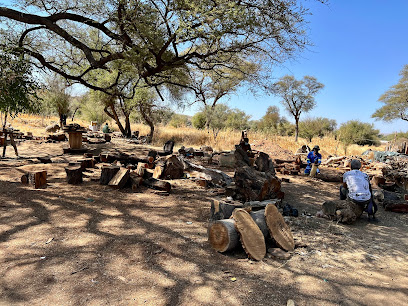
Dedes Place Okahandja
Experience Dedes Place in Okahandja – a cozy coffee shop and beer garden offering delightful brews, tasty bites, and a welcoming atmosphere.
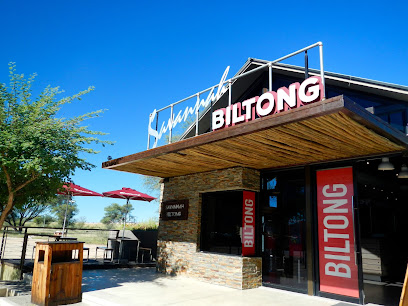
Okahandja Farm Lodge
Experience the serene beauty of Namibia at Okahandja Farm Lodge, where rustic charm meets modern comfort in a tranquil setting.

Okahandja Park Market
Discover the essence of Namibian culture at Okahandja Park Market, where vibrant stalls and local flavors await every visitor.
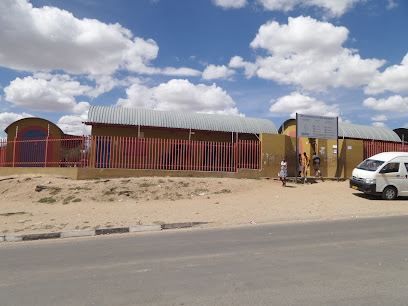
Kudu Statue
Discover the Kudu Statue in Windhoek, a symbolic tribute to Namibia's wildlife and cultural heritage, perfect for capturing unforgettable memories.
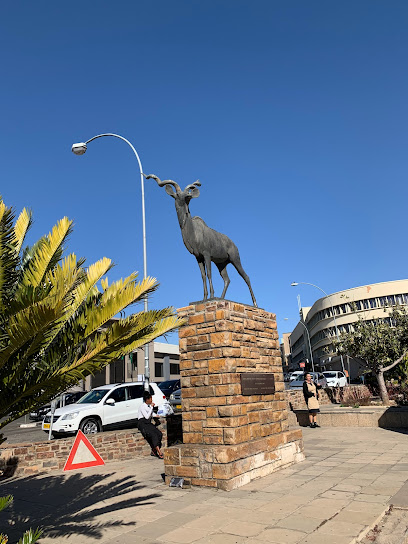
Ombo Rest Camp
Discover tranquility and adventure at Ombo Rest Camp, a serene campground nestled in the stunning landscapes of Namibia, perfect for outdoor enthusiasts.

Von Bach Dam Resort
Experience tranquility and adventure at Von Bach Dam Resort, a scenic lodge in Namibia offering stunning views and outdoor activities for all.
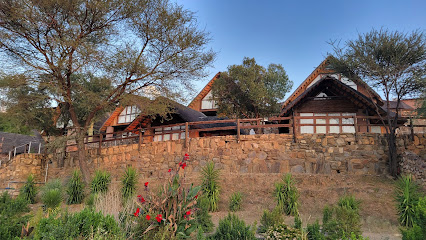
Moordkoppie
Explore the natural beauty and cultural history of Moordkoppie, a scenic hill near Okahandja, offering breathtaking views and rich local folklore.
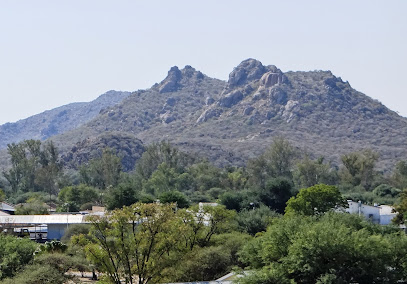
Otjisazu Guest Farm
Experience the charm of Otjisazu Guest Farm, a serene lodge near Okahandja, blending comfort, adventure, and local culture in Namibia.
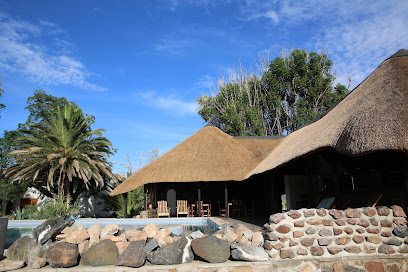
Okahandja Nau-Aib Stadium
Discover the vibrant spirit of Namibian soccer at Okahandja Nau-Aib Stadium, a hub of local sports and community gatherings.
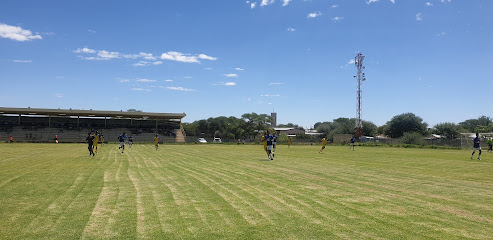
Sanderburg
Explore the historical elegance of Sanderburg Castle in Windhoek, Namibia, where stunning architecture meets rich cultural heritage.
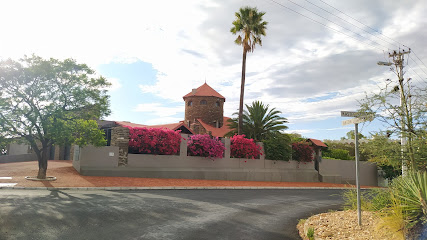
Farmstay Okakeua
Discover the tranquility of Farmstay Okakeua in Okahandja, Namibia - your perfect rural retreat surrounded by stunning landscapes and local culture.
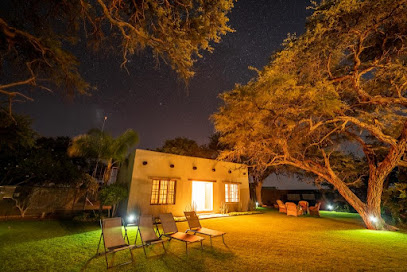
Military Museum Okahanja
Explore Namibia's military history at the Military Museum Okahandja, featuring engaging exhibits and outdoor displays that reveal the nation's past.

Okahandja Namibia
Discover Okahandja: A Cultural Gem in Namibia with Vibrant Markets, Rich History, and Scenic Landscapes Awaiting Your Exploration.

Unmissable attractions to see
Okapuka Safari Lodge
Discover the beauty of Namibia at Okapuka Safari Lodge, where adventure meets comfort amidst stunning landscapes.

Gross Barmen Hot Springs Resort
Discover tranquility and rejuvenation at Gross Barmen Hot Springs Resort, a premier destination for relaxation in Namibia's stunning landscapes.

Okahandja Mbangura Woodcarvers Craft Market
Explore the vibrant Okahandja Mbangura Woodcarvers Craft Market, a treasure trove of authentic Namibian crafts and artistry.
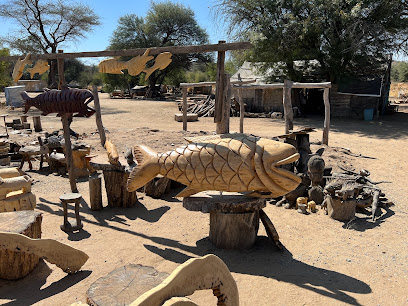
Haven Zoological Park
Discover the beauty of wildlife at Haven Zoological Park, Windhoek's premier animal park, perfect for families and nature enthusiasts.
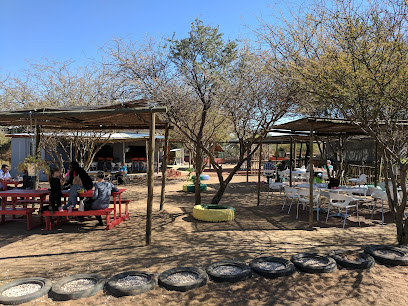
Avis Dam Nature Reserve
Explore Avis Dam Nature Reserve, a peaceful haven near Windhoek, rich in wildlife and scenic beauty, perfect for nature lovers and outdoor enthusiasts.
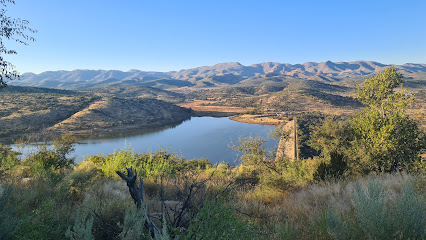
Düsternbrook Guest Farm
Discover the tranquil beauty of Düsternbrook Guest Farm in Windhoek, a perfect blend of adventure, comfort, and nature.
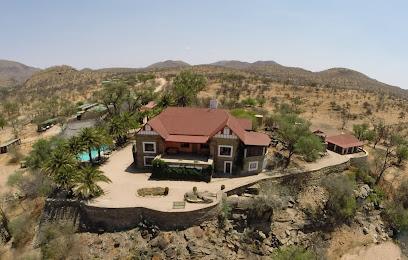
3 Circles viewpoint Windhoek
Experience the beauty of Windhoek at 3 Circles Viewpoint, where stunning landscapes and serene pathways create a perfect escape into nature.
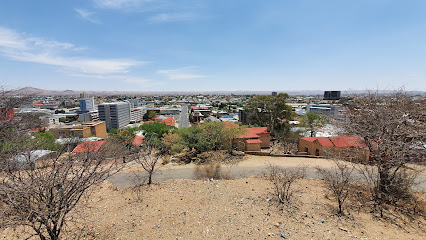
Heroes' Acre
Explore Heroes' Acre, an iconic war memorial in Windhoek celebrating Namibia's heroes and the spirit of resilience in a breathtaking setting.
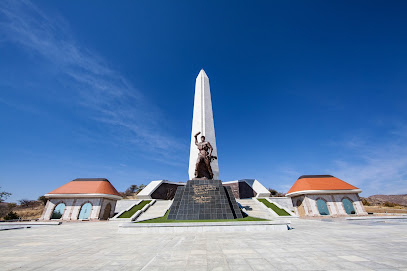
National Museum of Namibia: Owela Display Centre
Discover Namibia's rich history and cultural diversity at the National Museum of Namibia: Owela Display Centre in Windhoek, a must-visit for every traveler.
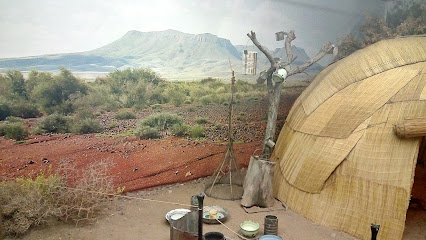
Moordkoppie
Visit Moordkoppie in Okahandja for breathtaking views, rich cultural stories, and an unforgettable Namibian experience.
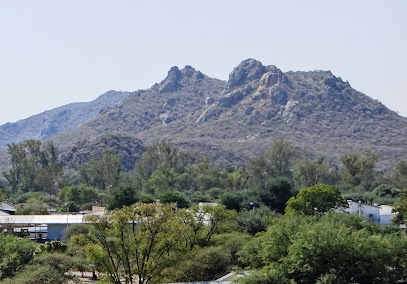
Otjiruze Hunting & Safaris
Discover the thrill of hunting and the beauty of wildlife at Otjiruze Hunting & Safaris in Central Namibia, a haven for adventure seekers.
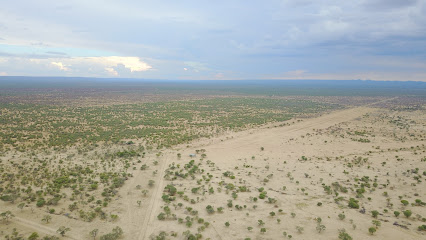
Geological Survey Museum
Explore Namibia's geological wonders at the Geological Survey Museum in Windhoek, where history and nature come together in fascinating exhibits.
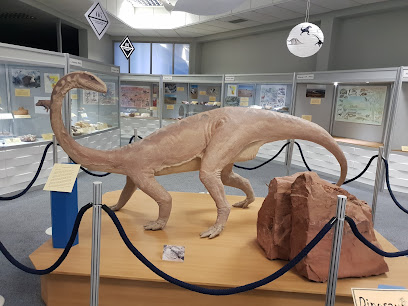
Panache Photographic Safaris Africa
Explore the breathtaking landscapes and wildlife of Namibia with Panache Photographic Safaris, a must-visit for photography enthusiasts and nature lovers alike.
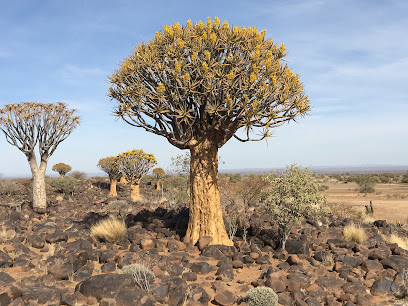
Okahandja- Windhoek (Rest Bay 1)
Explore the natural beauty and cultural richness of Rest Bay 1, a serene tourist attraction between Okahandja and Windhoek in Namibia.
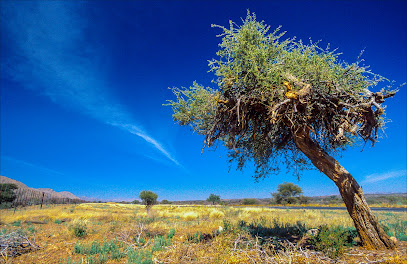
Farm Otjisazu
Explore Farm Otjisazu, a historical tourist attraction in Namibia, where breathtaking landscapes meet rich cultural heritage in a serene setting.

Essential places to dine
Dedes Place Okahandja
Experience the flavors of Namibia at Dedes Place Okahandja – where great food meets warm hospitality in a picturesque setting.
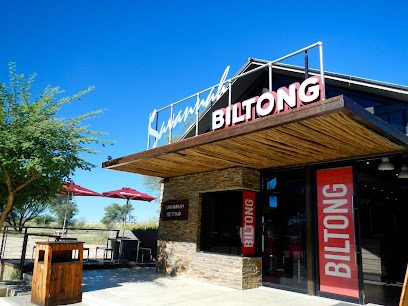
Wimpy
Experience delicious fast food at Wimpy in Okahandja—perfectly crafted meals served in a welcoming atmosphere.
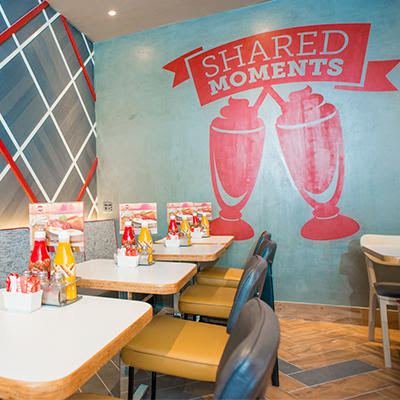
Rhino's
Experience the best of Namibian cuisine at Rhino's in Okahandja - where local flavors meet international flair.
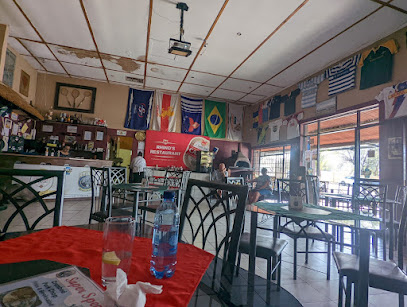
Grand Lake Spur
Discover Grand Lake Spur: A steak lover's paradise offering delicious African cuisine in a family-friendly setting.
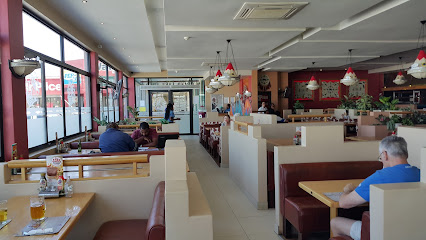
Backerei Dekker
Experience the essence of Namibian hospitality at Backerei Dekker – your go-to bakery for delightful breakfasts and freshly baked treats.
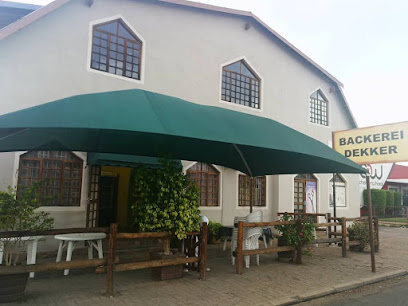
Hungry Lion Okahandja
Indulge in crispy fried chicken and local flavors at Hungry Lion Okahandja - your fast food haven in Namibia.
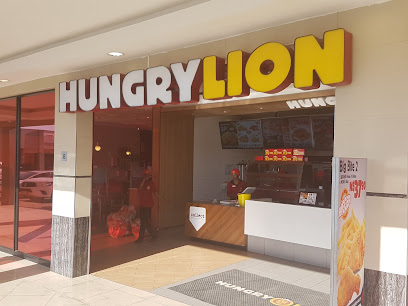
Stables 26 Bar & Restaurant
Discover delectable dishes and vibrant local culture at Stables 26 Bar & Restaurant in Okahandja.
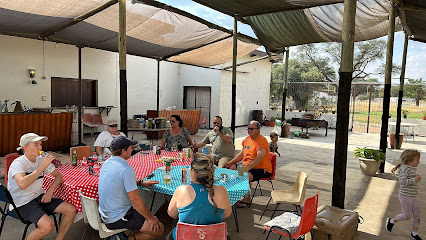
Debonairs Pizza
Experience mouthwatering pizzas at Debonairs Pizza in Okahandja - where flavor meets convenience!
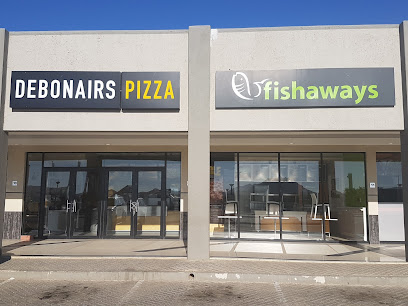
SoBisoo Chill Pub
Discover SoBisoo Chill Pub: A perfect blend of relaxation and local cuisine awaits you in Okahandja's vibrant dining scene.
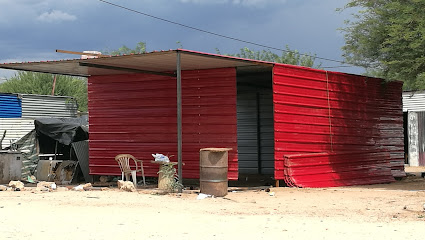
Fishaways
Experience fresh and flavorful seafood at Fishaways in Okahandja - a culinary delight for every seafood lover.

Rooi Koppie Bistro
Experience authentic Namibian cuisine at Rooi Koppie Bistro – where every meal tells a story of local flavors.
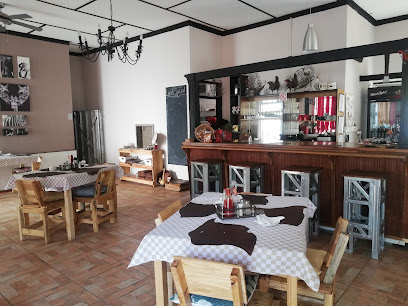
Okalongo bar
Discover authentic Namibian flavors at Okalongo Bar in Okahandja - where delicious grilled dishes meet a lively atmosphere.
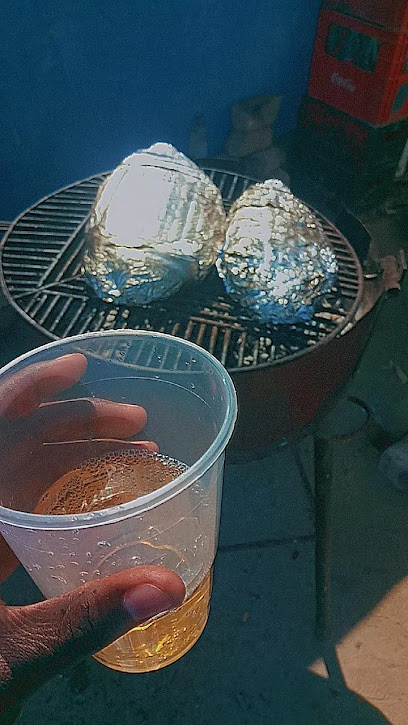
The Hot Dog Shack
Experience mouthwatering gourmet hot dogs at The Hot Dog Shack in Okahandja—perfect for satisfying cravings while exploring local attractions.
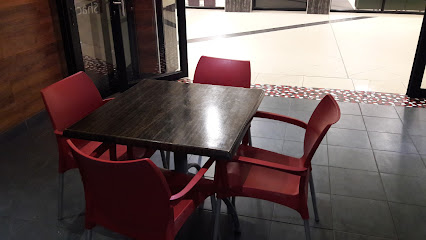
Amagoesa Bar
Discover flavorful grilled dishes at Amagoesa Bar in Okahandja – an inviting spot to savor local cuisine in a lively atmosphere.
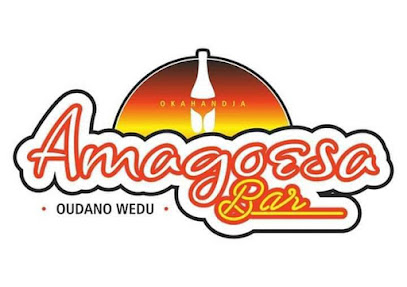
Amagoesa Bar and Fish Shop
Discover the flavors of Namibia at Amagoesa Bar and Fish Shop in Okahandja - where fresh fish meets vibrant local culture.
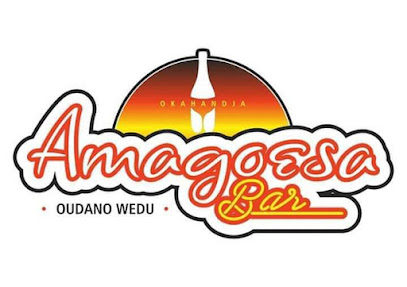
Markets, malls and hidden boutiques
Okahandja Shopping Centre
Explore Okahandja Shopping Centre: A lively hub for shopping, dining, and local culture in the heart of Namibia.
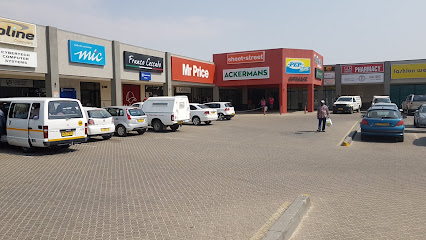
Okahandja Mbangura Woodcarvers Craft Market
Explore the vibrant Okahandja Mbangura Woodcarvers Craft Market for authentic Namibian woodcraft and a taste of local culture.
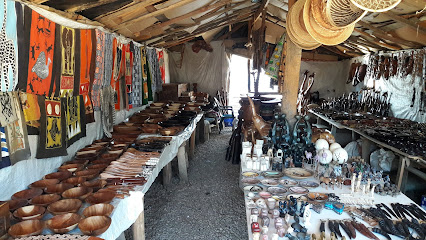
Dedes Place Okahandja
Discover the flavors of Namibia at Dedes Place, a cozy cafe in Okahandja offering delicious food and drinks in a vibrant atmosphere.
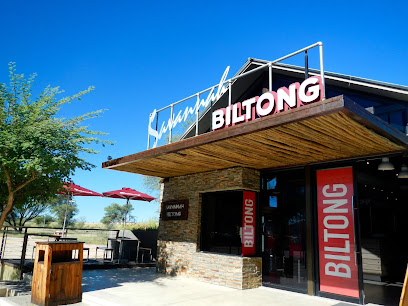
Shoprite Okahandja
Experience the heart of Okahandja at Shoprite, where local flavors and everyday essentials meet in a vibrant supermarket setting.
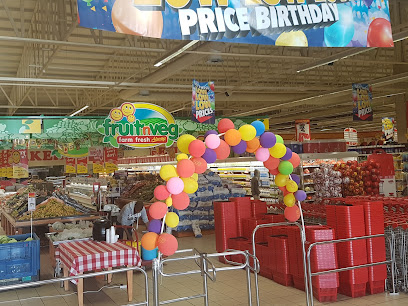
Pick n Pay
Explore the local flavors and essentials at Pick n Pay, Okahandja's premier grocery store and supermarket for tourists.
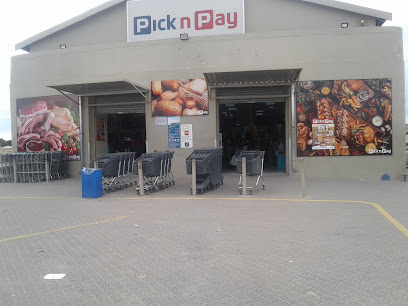
Piets Biltong
Discover the best of Namibian flavors at Piets Biltong in Okahandja, where authentic biltong and homemade delicacies await your taste buds.
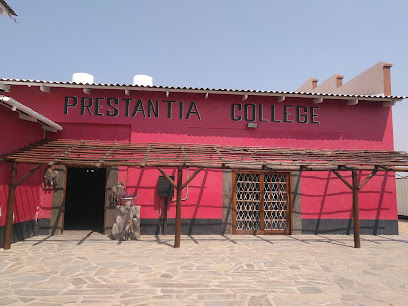
Closwa Biltong Factory Shop (Namibia)
Discover the rich flavors of Namibia at Closwa Biltong Factory Shop, where tradition meets taste in every bite of authentic biltong.
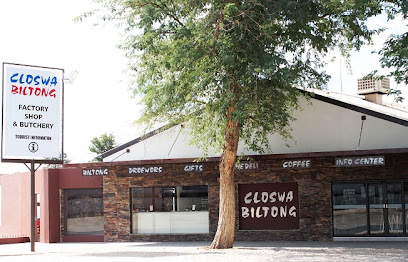
SPAR Okahandja
Discover fresh produce, local delicacies, and all your grocery needs at SPAR Okahandja, the heart of shopping in Namibia.

WB Supermarkets Okahandja
Discover local flavors and unique products at WB Supermarkets Okahandja, a vibrant grocery destination for tourists in Namibia.
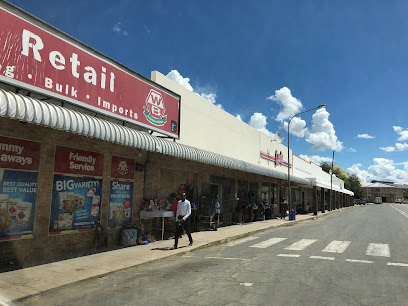
Build it Okahandja
Discover a wide range of building materials and tools at Build It Okahandja, your go-to destination for home improvement and DIY projects.
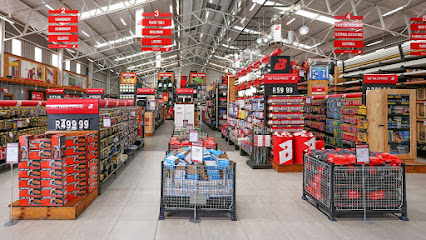
PEP Okahandja
Explore the vibrant PEP Okahandja, your ultimate destination for affordable fashion for the entire family, from stylish clothing to trendy accessories.
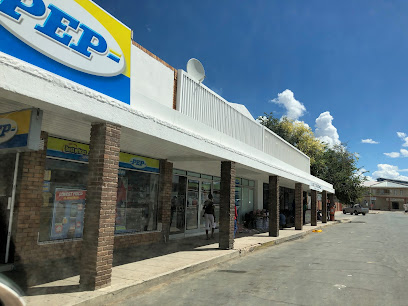
Clicks Okahandja
Discover Clicks Okahandja: Your trusted pharmacy and beauty supply store for all health needs while exploring Namibia.
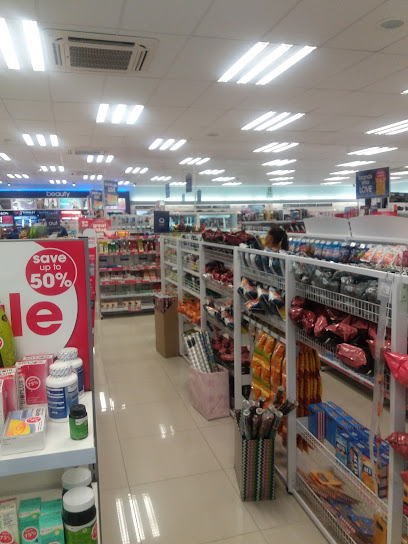
Usave Okahandja
Experience the essence of local shopping at Usave Okahandja, where fresh produce meets friendly service in the heart of Namibia.

Okahandja
Explore Okahandja: A vibrant town in Namibia offering local markets, supermarkets, and a rich cultural experience for every traveler.
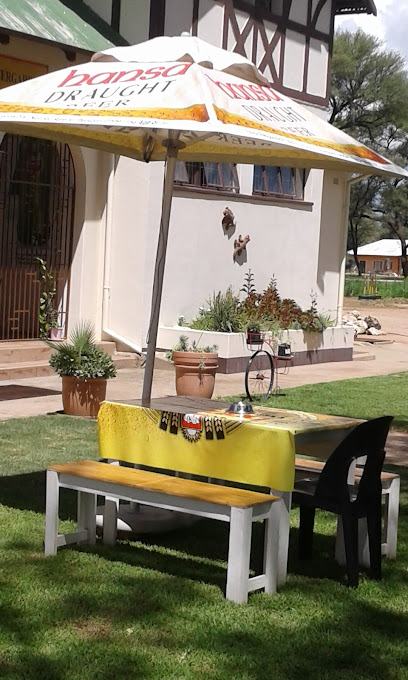
Outspan Wholesale
Explore Outspan Wholesale in Okahandja for top-quality hardware supplies and exceptional customer service.
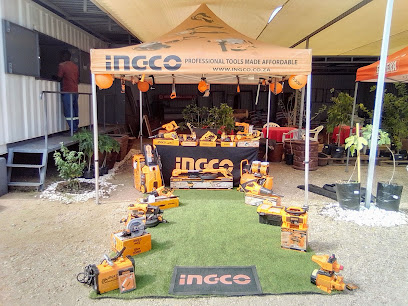
Essential bars & hidden hideouts
Dedes Place Okahandja
Discover the flavors of Okahandja at Dedes Place, a charming coffee shop and diner offering delicious meals and refreshing beverages in a cozy setting.
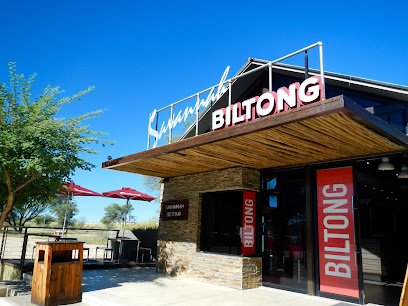
Rhino's
Experience the fusion of local flavors and international cuisine at Rhino's, Okahandja's culinary hotspot for tourists.
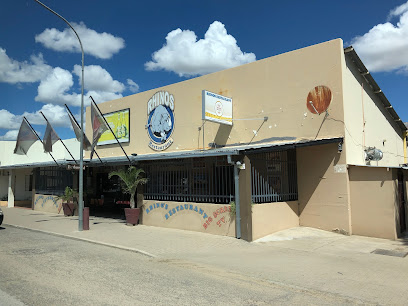
Grand Lake Spur
Experience the vibrant taste of African cuisine at Grand Lake Spur in Okahandja, offering family-friendly dining and exceptional steak dishes.
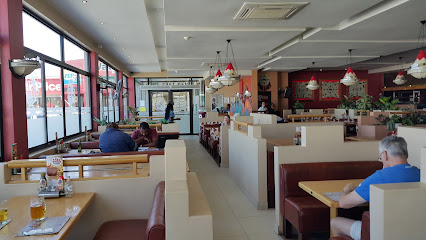
Stables 26 Bar & Restaurant
Experience the vibrant flavors of Stables 26 Bar & Restaurant in Okahandja, where local cuisine meets international delights in a welcoming atmosphere.
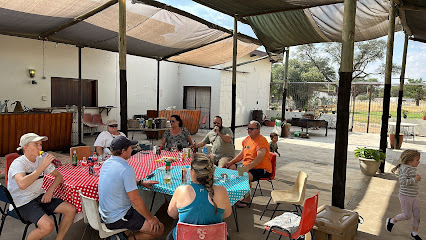
SoBisoo Chill Pub
Experience local flavors and a vibrant atmosphere at SoBisoo Chill Pub, the perfect chill spot in Okahandja, Namibia.
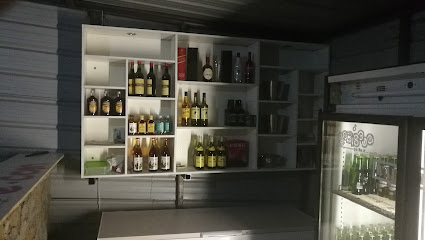
Oshako bar an lounge
Discover the lively atmosphere and local flavors at Oshako Bar and Lounge in Okahandja, the perfect spot for relaxation and entertainment.
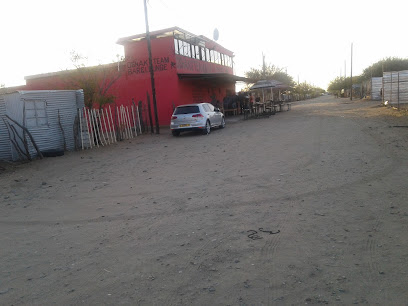
Okalongo bar
Discover the vibrant atmosphere of Okalongo Bar in Okahandja, where Namibian flavors and local camaraderie come together for an unforgettable experience.
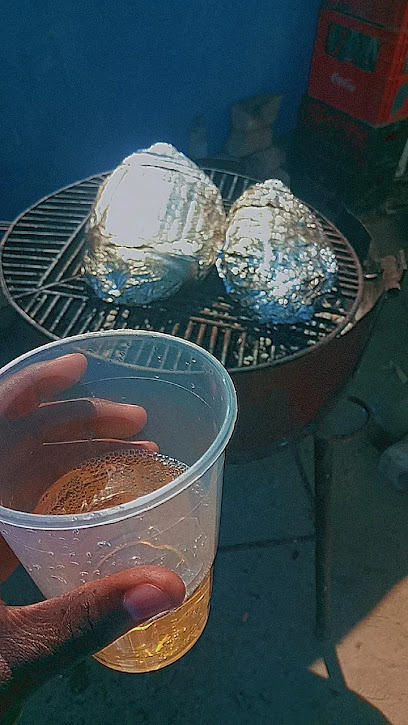
Club 40 Second
Discover the vibrant nightlife of Okahandja at Club 40 Second, where delicious cocktails and a lively atmosphere await.

Amagoesa Bar
Discover Amagoesa Bar in Okahandja, where delicious grilled delights and a warm atmosphere await every traveler.
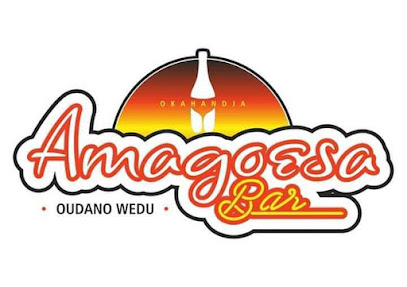
The Location Bar
Experience the vibrant nightlife at The Location Bar in Okahandja, where great drinks and local culture blend seamlessly.
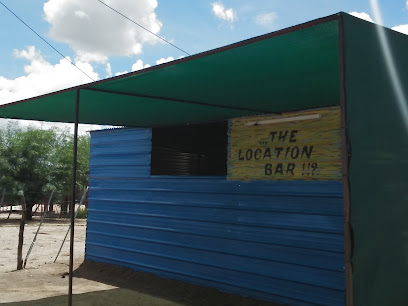
Old Power The Revolution Bar
Discover the lively nightlife of Okahandja at Old Power The Revolution Bar, where friendly vibes and local flavors create unforgettable memories.
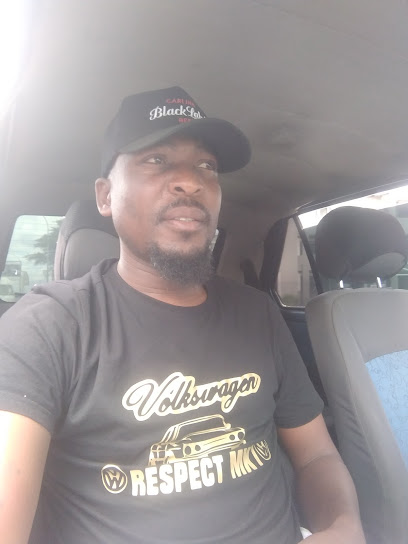
Amagoesa Bar and Fish Shop
Experience the authentic flavors of Namibia at Amagoesa Bar and Fish Shop in Okahandja, where delicious grilled seafood meets a warm, inviting atmosphere.
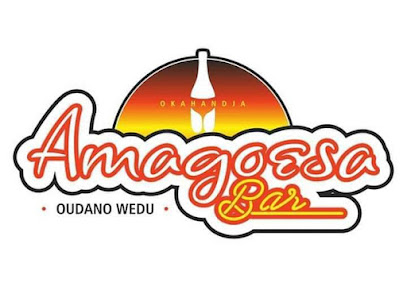
The Cups Okahandja
Discover a family-friendly haven at The Cups Okahandja, where delicious meals and a welcoming atmosphere await you.
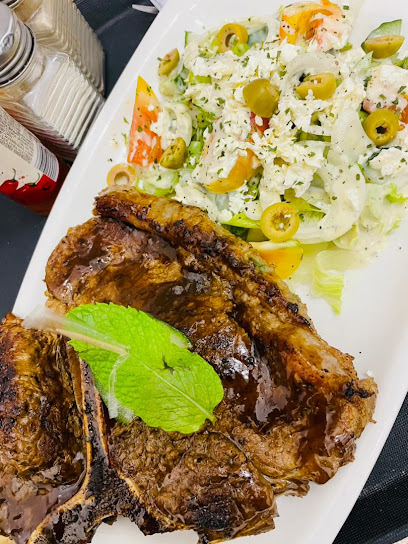
ROMEO
Experience the lively atmosphere and diverse drink selection at ROMEO Bar, a must-visit spot for nightlife enthusiasts in Okahandja.

KK Lounge
Experience the rich flavors of Okahandja at KK Lounge, where expertly grilled cuisine meets a vibrant atmosphere.

Local Phrases
-
- HelloTjike
[chee-keh] - GoodbyeKala po
[kah-lah poh] - YesEe
[eh] - NoAa
[ah] - Please/You're welcomeKaande
[kah-ahn-deh] - Thank youTatene
[tah-teh-neh] - Excuse me/SorryTatele
[tah-teh-leh] - How are you?Ondjano
[on-jah-noh] - Fine. And you?Ondjano. Iiye
[on-jah-noh eeh-yeh] - Do you speak English?Oyandele po Englitha?
[oh-yahn-deh-leh poh eng-lee-tah] - I don't understandAa ndele
[ah n-deh-leh]
- HelloTjike
-
- I'd like to see the menu, pleaseNdapandula nde menu, kaande
[n-dah-pahn-doo-lah n-deh meh-noo, kah-ahn-deh] - I don't eat meatAa ote ondjave
[ah oh-teh on-jah-veh] - Cheers!Oha
[oh-hah] - I would like to pay, pleaseNdapandula nde kana, kaande
[n-dah-pahn-doo-lah n-deh kah-nah, kah-ahn-deh]
- I'd like to see the menu, pleaseNdapandula nde menu, kaande
-
- Help!Ota
[oh-tah] - Go away!Ha nawa!
[hah nah-wah] - Call the Police!Onane o mpandu!
[oh-nah-neh oh m-pahn-doo] - Call a doctor!Onane o dhokota!
[oh-nah-neh oh doh-koh-tah] - I'm lostAa owa
[ah oh-wah] - I'm illAa ondjave
[ah on-jah-veh]
- Help!Ota
-
- I'd like to buy...Ndapandula nde hala...
[n-dah-pahn-doo-lah n-deh hah-lah...] - I'm just lookingNande tatele
[nahn-deh tah-teh-leh] - How much is it?Ongi na?
[on-gee nah] - That's too expensiveOngi na shi hala
[on-gee nah shee hah-lah] - Can you lower the price?Ongi na tatele shi hala?
[on-gee nah tah-teh-leh shee hah-lah]
- I'd like to buy...Ndapandula nde hala...
-
- What time is it?Ondjila onene?
[on-jee-lah oh-neh-neh] - It's one o'clockOndjila onene
[on-jee-lah oh-neh-neh] - Half past (10)Ondjila omweya
[on-jee-lah oh-mweh-yah] - MorningOlukuro
[oh-loo-koo-roh] - AfternoonOndjawe
[on-jah-weh] - EveningOndjatu
[on-jah-too] - YesterdayOmanene
[oh-mah-neh-neh] - TodayOnene
[oh-neh-neh] - TomorrowOndje
[on-jeh] - 1Omweya
[oh-mweh-yah] - 2Ondi
[on-dee] - 3Ongatu
[on-gah-too] - 4Ondjove
[on-joh-veh] - 5Ongombe
[on-gohm-beh] - 6Ondjoma
[on-joh-mah] - 7Ondjupa
[on-joo-pah] - 8Ondjupa tatu
[on-joo-pah tah-too] - 9Ondjupa ngatu
[on-joo-pah ngah-too] - 10Ondjupa omweya
[on-joo-pah oh-mweh-yah]
- What time is it?Ondjila onene?
-
- Where's a/the...?Omo o...
[oh-moh oh...] - What's the address?Omo oshipokati?
[oh-moh oh-she-poh-kah-tee] - Can you show me (on the map)?Ondjele po (pamap)?
[on-jeh-leh poh (pah-map)] - When's the next (bus)?Omo omweya opo?
[oh-moh oh-mweh-yah oh-poh] - A ticket (to ....)Ondjele omweya (va ....)
[on-jeh-leh oh-mweh-yah (vah)]
- Where's a/the...?Omo o...
History of Okahandja
-
Okahandja, often referred to as the 'Garden Town of Namibia,' was formally established in 1894. The town's name is derived from the Otjiherero words 'okaha' (small) and 'ndja' (wide), referencing the wide floodplains of the Swakop River in the area. It became an essential settlement for the Herero people and later a significant administrative center during the German colonial period.
-
One of the most significant events in Okahandja's history is the Herero and Nama Rebellion against German colonial rule from 1904 to 1908. The conflict began in Okahandja on January 12, 1904, when the Herero people, led by Chief Samuel Maharero, launched an attack against the Germans. This rebellion was a crucial moment in the fight against colonial oppression, although it unfortunately led to tragic consequences for the Herero and Nama communities.
-
Chief Hosea Kutako is one of the most revered figures in Namibian history, and his legacy is closely tied to Okahandja. Born in 1870, Kutako was a prominent leader of the Herero people and played a crucial role in their resistance against German colonial forces. After the rebellion, he continued to fight for his people's land rights and was a significant figure in Namibia's struggle for independence. Today, his grave in Okahandja is a national monument and a site of pilgrimage.
-
Red Flag Day is a significant cultural event in Okahandja, celebrated annually on the last weekend of August. This event commemorates the Herero people's history and their leaders, particularly Chief Samuel Maharero. During the celebration, descendants of the Herero people gather to honor their ancestors with traditional rituals, dances, and speeches. It is a vibrant display of Herero heritage and a reminder of the community's resilience and unity.
-
Okahandja played a notable role in Namibia's journey to independence. The town was a center for political activism during the apartheid era, with many local leaders actively participating in the liberation movement. The presence of significant historical figures, such as Chief Hosea Kutako, and the town's strategic location contributed to its importance in the fight against South African rule. Okahandja's legacy in the struggle for freedom is a point of pride for its residents.
-
Today, Okahandja is a town that beautifully blends its rich cultural heritage with modernity. The town is known for its vibrant markets, particularly the Okahandja Craft Market, where visitors can find handmade crafts and artifacts reflecting Namibia's diverse cultures. The town's historical sites, such as the graves of Herero leaders and the old German fort, offer a glimpse into its storied past. Okahandja remains a living testament to Namibia's history and cultural diversity.
Okahandja Essentials
-
Okahandja is located approximately 70 kilometers north of Windhoek, the capital of Namibia. The easiest way to reach Okahandja is by road. You can rent a car from Windhoek and drive along the B1 highway, which takes about an hour. Alternatively, several shuttle services operate between Windhoek and Okahandja. For those preferring public transport, there are regular bus services that connect the two cities.
-
Once in Okahandja, you can explore the town on foot as many attractions are within walking distance. Taxis are available for longer distances or if you prefer not to walk. It's advisable to agree on a fare before starting your journey. Car rentals are also an option for those looking to explore the surrounding areas at their own pace. Public buses and minibuses (kombis) operate within the town and to nearby regions.
-
The official currency in Namibia is the Namibian Dollar (NAD), which is interchangeable with the South African Rand (ZAR). Credit cards are widely accepted in hotels, restaurants, and larger shops in Okahandja. However, it's advisable to carry some cash for smaller establishments and street vendors. ATMs are available in the town for cash withdrawals.
-
Okahandja is generally a safe destination for tourists. However, standard precautions should be taken. Avoid walking alone at night, especially in unfamiliar areas. Be cautious with your belongings in crowded places such as markets. While Okahandja does not have specific high-crime areas targeting tourists, always stay vigilant and aware of your surroundings.
-
In case of emergency, dial 10111 for police assistance or 2032276 for medical emergencies. The local police station and medical facilities are available in Okahandja. It is highly recommended to have travel insurance that covers medical emergencies. For minor health issues, there are pharmacies in the town where you can purchase over-the-counter medications.
-
Fashion: Do dress modestly and comfortably, considering the hot climate. Avoid wearing very revealing clothing. Religion: Do respect local customs and traditions, especially when visiting religious sites. Public Transport: Do be patient and courteous when using public transport. Don’t eat or drink on public transport. Greetings: Do greet people with a handshake. A smile and a friendly greeting in the local language ('Goeie dag' in Afrikaans) are appreciated. Eating & Drinking: Do try local delicacies and accept food offerings graciously. Don’t refuse hospitality, as it is considered impolite.
-
To experience Okahandja like a local, visit the local markets such as the Okahandja Mbangura Woodcarvers Market, where you can buy handmade crafts and souvenirs. Engage with locals; they are often friendly and willing to share stories about the town's history and culture. Don't miss visiting the Von Bach Dam for a relaxing day by the water or the historical Okahandja Cemetery where prominent Namibian figures are buried.
Trending Landmark in Okahandja
-
Gross Barmen Hot Springs Resort
-
Okahandja Mbangura Woodcarvers Craft Market
-
Dedes Place Okahandja
-
Okahandja Farm Lodge
-
Okahandja Park Market
-
Kudu Statue
-
Ombo Rest Camp
-
Von Bach Dam Resort
-
Moordkoppie
-
Otjisazu Guest Farm
-
Okahandja Nau-Aib Stadium
-
Sanderburg
-
Farmstay Okakeua
-
Military Museum Okahanja
-
Okahandja Namibia
Nearby Cities to Okahandja
-
Things To Do in Windhoek
-
Things To Do in Karibib
-
Things To Do in Omaruru
-
Things To Do in Usakos
-
Things To Do in Otjiwarongo
-
Things To Do in Outjo
-
Things To Do in Swakopmund
-
Things To Do in Walvis Bay
-
Things To Do in Etosha Village
-
Things To Do in Mariental
-
Things To Do in Tsumeb
-
Things To Do in Oshakati
-
Things To Do in Ongwediva
-
Things To Do in Keetmanshoop
-
Things To Do in Rundu







